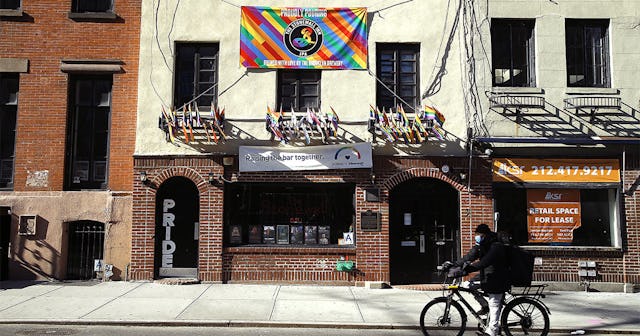I Am Worried About A Backslide In LGBTQIA+ Rights

As COVID-19 started to spread through the United States, I naively hoped it wouldn’t be too bad. I hoped we could contain it somehow and that life could go on as usual. I stared at my calendar and planned on still holding the four LGBTQIA+ seminars I was scheduled to teach at the end of March. I was finalizing details for professional trainings at local businesses. I was beginning to reach out to summer camp directors to see what their needs were for getting counselors comfortable with working with queer campers, out or not. I had just applied for a job at a local university to be an LGBTQIA+ outreach and education coordinator. I actively reminded folks about the importance of respecting folks’ pronouns; remove gendered language for inclusivity! Queer education is my jam and my purpose.
And then it all stopped. All speaking engagements, trainings, and hiring processes came to a grinding halt. The pandemic seems to have stopped progress, and I am worried about what it will do for LGBTQIA+ rights.
I am scared for our vulnerable populations and for the front line responders treating the sick and managing stores with essential goods. Of course everything has changed, and I have done my part to keep myself and others healthy, but I feel a tremendous loss of purpose right now. I feel untethered without being able to complete my social justice and advocacy work. So much focus, and rightfully so, is being put on all things coronavirus. But while folks’ attention is on the pandemic, issues that hurt marginalized communities, specifically the queer community, are being ignored or allowed to breed. I am mourning the loss of queer visibility and the fight for equality.
Shortly before the coronavirus hit the fan in the United States, many advocates — myself included — were speaking out against several states’ efforts to ban doctors from providing gender-affirming care to transgender youth. There was also movement to ban athletes from competing on sports teams that align with their gender identity. And on the eve of International Day of Transgender Visibility, Idaho passed two anti-transgender bills. One bill denies a person’s ability to change their gender marker on their birth certificate, and the other bans transgender girls and women from competing in women’s sports leagues. Instead of being celebrated for living as our true selves, we were denied the right to exist. These bills made being visible a “justified” reason for discrimination. While no one seemed to be looking, the queer community was shoved aside and hurt again because of bigotry and garbage politicians.
I am worried about the queer community’s ability to fight for itself. I am worried about the folks being forced into isolation with unsupportive people. I am worried about our physical safety and our financial security. We are already a population granted fewer rights, making less money, and facing more discrimination that our cisgender and straight peers. According to Human Rights Campaign, COVID-19 is affecting about 40% of LGBTQ workers because over five million queer people work in the top five industries being impacted by the virus. This is compared to about 22% of non-queer folks in the same work places. Also, the 15% of queer people who work in the restaurant business are not only out of work, but they were only making a median wage of $11.09/hour. Our money is being drained, and the reality is that it will be harder for queer and marginalized folks to rebound from this.
Pride centers rely on fundraisers, silent auctions, and sponsored events to raise money for the programs they offer and staff they pay to run them. Without the ability to hold these events, money that is budgeted to keep safe spaces open is gone. Businesses and donors that once donated to Pride centers are tightening their purse strings either in fear or in need of saving money. School-organized LGBTQIA+ groups, PFLAG meetings, and community events are canceled indefinitely. The physical spaces that held our people and our escape are closed. I worry about their ability to reopen.
Actually, I know they will reopen. My true worry is that when we return to our spaces, we will have suffered damage that will need to be addressed before we can move on and forward again. This work to build ourselves back to fighting strength will be healing on many levels, and I hope we can pick up where we left off, even while regaining emotional strength and physical presence in mainstream places.
It was hard enough convincing schools, companies, and other non-profit organizations to pay for LGBTQIA+ educators to provide necessary training for teachers, staff, and employees. It is going to be even harder when we finally resume a bit of normalcy because of coronavirus-related budget cuts and financial losses. While my work is essential to the folks who need and deserve safe learning and work environments and is essential for my financial security, many places will no longer see queer education as essential. Equality will take a backseat if it carries a financial burden.
It seems like the last thing on anyone’s mind is the well-being of the queer community. My hope is that we will return to the forefront quickly, but right now I am grieving. I have gone into self-preservation mode, but I have not forgotten about my purpose.
I am willing health, hope, and peace of mind to all of my LGBTQIA+ community members while we navigate this pandemic. I am willing medical staff to appropriately gender a sick trans person and honor a queer relationship when a member of my community needs to be treated for COVID-19 because even during—especially during—a crisis, we deserve to be treated with dignity and compassion.
Trainings may have been canceled, but our right for respect still holds on.
This article was originally published on